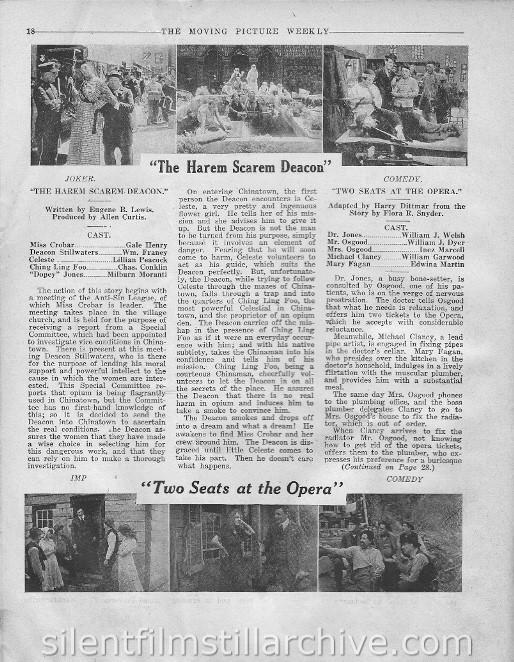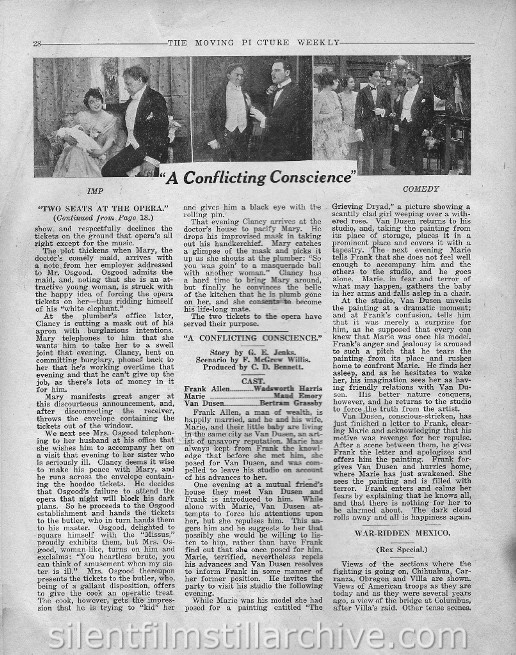![]()

Two Seats at the Opera (1916)

"Two Seats at the Opera"
IMP COMEDY
Apapted by Harry Dittmar from the Story by Flora R. Snyder.
CAST
|
Dr. Jones |
William J. Welsh |
|
Mr. Osgood |
William J. Dyer |
|
Mrs. Osgood |
Inez Marcell |
|
Michael Clancy |
William Garwood |
|
Mary Fagan |
Edwina Martin |
Dr. Jones, a busy bone-setter, is consulted by Osgood, one of his patients, who is on the verge of nervous prostration. The doctor tells Osgood that what he needs is relaxation, and offers him two tickets to the Opera, which he accepts with considerable reluctance.
Meanwhile, Michael Clancy, a lead pipe artist, is engaged in fixing pipes in the doctor's cellar. Mary Fagan, who presides over the kitchen in the doctor's household, indulges in a lively flirtation with the muscular plumber and provides him with a substantial meal.
The same day Mrs. Osgood phones to the plumbing office, and the boss plumber delegates Clancy to go to Mrs. Osgood,'s house to fix the radiator, which is out of order.
When Clancy arrives to fix the radiator Mr. Osgood, not knowing how to get rid of the opera tickets, offers them to the plumber, who expresses his preference for a burlesque (Continued on Page 28).

show and respectfully declines the tickets on the ground that opera's all right except for the music.
The plot thickens when Mary, the doctor's comely maid, arrives with a note from her employer addressed to Mr. Osgood. Osgood admits the maid, and, noting that she is an attractive young woman, is struck with the happy idea of forcing the opera tickets on her-thus ridding himself of his "white elephant".
At the plumber's office later, Clancy is cutting a mask out of his apron with burglarious intentions. Mary telephones to him that she wants him to take her to a swell joint that evening. Clancy, bent on committing burglary, phones back to her that he's working overtime that evening and that he can't give up the job, as there's lots of money in it for him.
Mary manifests great anger at this discourteous announcement, and after disconnecting the receiver, throws the envelope containing the tickets out of the window.
We next see Mrs. Osgood telephoning to her husband at his office that she wishes him to accompany her on a visit that evening to her sister who is seriously ill. Clancy deems it wise to make his peace with Mary, and he runs across the envelope containing the hoodoo tickets. He decides that Osgood's failure to attend the opera that night will block his dark plans. So he proceeds to the Osgood establishment and hands the tickets to the butler, who in turn hands them to his master. Osgood, delighted to square himself with the "Missus," proudly exhibits them, but Mrs. Osgood, woman-like, turns on him and exclaims: "You heartless brute, you can think of amusement when my sister is ill." Mrs. Osgood thereupon presents the tickets to the butler, who, being of a gallant disposition, offers to give the cook an operatic treat. The cook, however, gets the impression that he is tryin to "kid" her and gives him a black eye with the rolling pin.
That evening, Clancy arrives at the doctor's house to pacify Mary. He drops his improvised mask in taking out his handkerchief. Mary catches a glimpse of the mask and picks it up as she shouts at the plumber: "So you was goin' to a masquerade ball with another woman." Clancy has a hard time to bring Mary around, but finally he convinces the belle of the kitchen that he is plumb gone on her, and she consents to become his life-long mate.
The two tickets to the opera have served their purpose.
From The Moving Picture Weekly, July 8, 1916, pages 18 and 28
with William Welsh and William Dyer. Directed by William Garwood. IMP/Universal.
More Information on this film...

This work (Two Seats at the Opera (1916),
by Universal),
identified by
Bruce Calvert, is free of known copyright
restrictions.
Books
(none)
Last Modified May 5, 2012.



















